New Joint Chiefs Chair Appointed: A Deep Dive into the Role and Impact
The appointment of a new Chairman of the Joint Chiefs of Staff is a significant event in American politics and military affairs. This position holds immense responsibility, influencing national security strategy and military operations globally. This article will delve into the intricacies of this role, exploring the selection process, the responsibilities of the office, and the potential impact of the new appointee.
Understanding the Role of the Joint Chiefs Chair
The Chairman of the Joint Chiefs of Staff (CJCS) is the highest-ranking military officer in the United States Armed Forces. They serve as the principal military advisor to the President, the National Security Council, and the Secretary of Defense. Crucially, the CJCS does not have command authority over any of the individual military services. Instead, their power lies in their influence and ability to integrate the operational plans and strategies of the Army, Navy, Air Force, Marine Corps, and Space Force.
Key responsibilities of the CJCS include:
- Providing military advice: Advising the President and other senior leaders on military matters, including strategy, operations, and resource allocation.
- Integrating the services: Ensuring that the different branches of the military work together effectively.
- Managing the Joint Staff: Overseeing the Joint Staff, a group of military officers who support the CJCS.
- Representing the military: Acting as the public face of the US military, representing the Armed Forces in national and international settings.
The Selection Process and Significance
The selection of the CJCS is a rigorous process, involving extensive vetting and consideration. The President nominates a candidate, who then undergoes Senate confirmation hearings before taking office. The nominee's experience, qualifications, and understanding of national security issues are closely scrutinized. Past appointments have included individuals with extensive combat experience, expertise in specific military branches, or a background in joint operations. The appointee's background and perceived political leanings are often points of intense debate during the confirmation process.
Potential Impact of the New Appointment
The appointment of a new CJCS can significantly impact the direction of US military policy and strategy. The new Chairman will bring their unique perspective, experiences, and priorities to the role. This can influence decisions on issues such as:
- Resource allocation: The CJCS plays a vital role in determining how military resources are distributed among different branches and programs.
- Military modernization: The direction of military modernization efforts, focusing on emerging threats and technological advancements, will be profoundly shaped by the Chairman's vision.
- Military engagement: The approach to military engagements and interventions abroad, whether through deployments or diplomatic efforts, will be informed by the CJCS's advice and strategy.
Conclusion: A Pivotal Role in National Security
The appointment of the new Joint Chiefs Chair is a moment of significant consequence for the United States and global security. The incoming Chairman's leadership, strategic vision, and ability to effectively integrate the branches of the military will shape national security policy and military operations for years to come. Understanding the role, the selection process, and the potential impact of the new appointee is crucial for anyone following US politics and national security. Careful consideration of these factors will allow for a thorough understanding of the incoming leadership's potential influence on US military strategy and its global implications.
